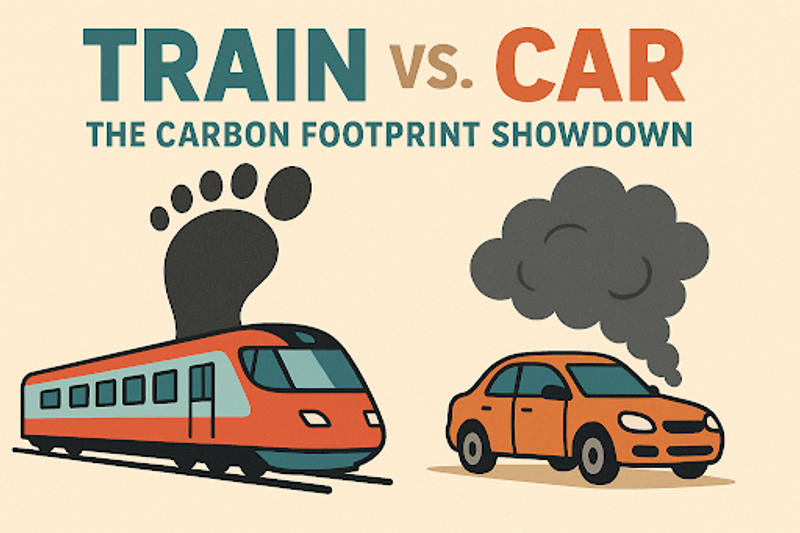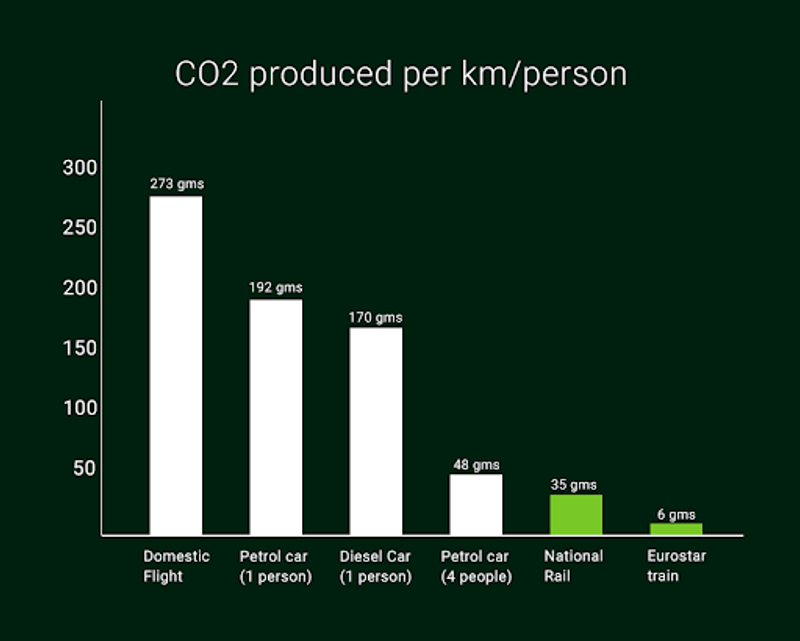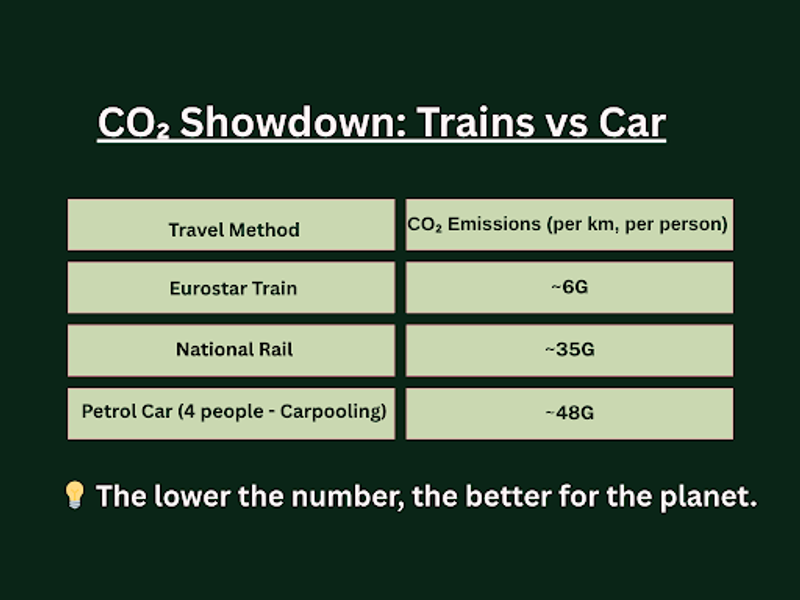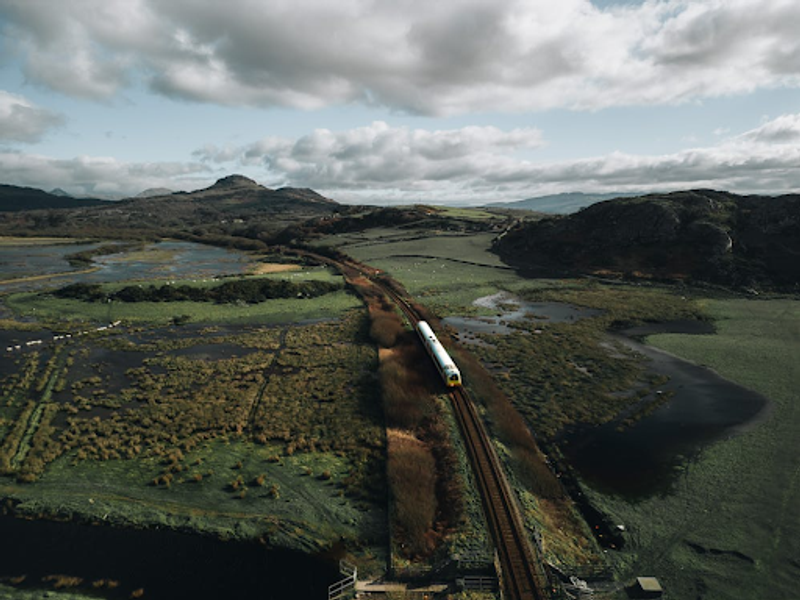Have you ever stopped to think about how your holiday plans affect the planet?
Whether you're heading to Cornwall’s coast, the Scottish Highlands, or a charming town in the Cotswolds, every journey leaves a mark on the environment. As climate change becomes more urgent and nature continues to feel the strain, making smart, sustainable travel choices matters more than ever.
One of the biggest choices you make is also one of the easiest to switch, how you get from A to B.
So let’s talk about one of the most debated travel questions in the UK: Train vs Car
Why Does the Way You Travel Matter?
In addition to your convenience and cost, choosing between train travel and car travel is also about your carbon footprint. Your mindful choice matters as it directly impacts greenhouse gas emissions and the protection of our natural landscapes.
Transport accounts for about 29% of the UK’s total CO₂ emissions, with cars being one of the largest contributors. Every car on the road adds to greenhouse gas emissions, air pollution, and road congestion.
When we choose eco-friendly travel options like trains, we take meaningful steps toward lowering those numbers.
The Numbers: Train vs Car Travel in the UK

Ever wonder which is greener, hopping on a train or driving your car? Here's the short answer: Trains win, almost every time. According to a recent Greenly article, train travel is one of the cleanest modes of transport in the UK.
Let’s break it down so it’s easy to grasp:
Cars: Convenient, But Carbon-Heavy
- Driving alone in a petrol or diesel car? You’re creating up to 30 times more CO₂ than taking a train.
- Even carpooling doesn’t fully catch up with how effective train travel can be.
Here’s a list of CO2 produced per KM by the following modes of transport.
- Domestic Flight = 273 g CO₂ per person
- Petrol car (1 person) = 192g CO₂ per person
- Diesel Car (1 person) = 170 g CO₂ per person
- Petrol car with 4 people = 48g CO₂ per person
- National Rail = 35g CO₂ per person
- Eurostar train = 6g CO₂ per person

Trains: The Unsung Hero
- Electric trains like the Eurostar are incredibly efficient; they use renewable electricity and move hundreds of people at once.
- Diesel-powered trains (common in rural UK) are mostly environmentally cleaner than most cars.
- Bonus: You can nap, read, or just enjoy the view. No traffic, No stress!
So, who wins?

What About Convenience?
Cars can indeed feel more flexible. You can leave when you want, stop where you like, and carry as much luggage as you can fit in the boot.
But here’s the catch: Not every trip needs that level of flexibility. Many of the UK’s top destinations, like Bath, Edinburgh, Oxford, and York, are easily accessible by train. You arrive in the heart of the city, no parking needed, and no traffic jams on the way in.
Plus, with train tickets booked in advance, you can often travel for less than the total cost of fuel, parking, and congestion charges. Hence, to answer the question of Train Vs Car? The train can be your answer every time until your destination doesn't support train travel.
The Hidden Costs of Car Travel
Solo car travel dramatically increases your carbon footprint, making it one of the most inefficient modes of transport for one person and a top contributor to greenhouse gas emissions across the UK.
Let’s not forget the hidden environmental cost of driving that contributes to:
- Microplastic pollution from tyre wear
- Noise pollution that disrupts wildlife
- Infrastructure damage requiring resource-intensive repairs
Also, solo car travel dramatically increases your carbon footprint, making it one of the most inefficient modes of transport for one person.
If you want to cut your carbon footprint, the train is often the smarter move.
What If You Have to Drive?
Go electric or hybrid: These options produce lower emissions or none at all, helping reduce the overall burden of greenhouse gas emissions from road travel.
Sometimes, the train just doesn’t work. Maybe you're heading somewhere remote, or traveling with kids and a lot of gear. That’s okay. Driving doesn’t have to be a problem if you make it more eco-conscious.
Here’s how:
- Carpool: Share your ride to cut emissions per person.
- Drive efficiently: Gentle acceleration and braking reduce fuel consumption.
- Go electric or hybrid: These options produce lower emissions.
- Avoid unnecessary short trips: These pollute the most because engines give off more emissions when they’re started cold and haven’t warmed up yet.
This shift towards eco-conscious travel is exactly what we explore in Why More People Are Choosing Eco Tourism in the UK,a deep dive into what’s driving this change and how mindful escapes are becoming the new normal.

Every bit helps. Even making one green travel swap a month can lower your carbon footprint over time.
Trains Are Not Just Greener, They’re Better for You
Here’s what you get when you take the train:
- Less stress: No traffic or confusing road signs, and trains operate on time.
- Time to unwind: Read, listen to music, nap, or get work done
- Stunning views: The UK rail network offers some of the most scenic journeys.
- Connectivity: Arrive in the town centre, not a car park 20 minutes away
Eco-friendly travel can make the journey just as enjoyable as the destination.
Ready to slow down and soak it all in? What Does Slow Travel Mean? A Beginner’s Guide to Practising It will change how you experience your journeys.
Are trains perfect?
Do you still have doubts, like train delays, strikes, ticket costs, and limited rural access? That’s the beauty. Travellers are shifting towards train travel. With more and more people choosing train travel every day, train journeys are becoming more likable and popular.
With increasing investment in electric trains and updated infrastructure, train travel is only getting cleaner and more reliable. And many operators now offer low-cost tickets and flexible passes for regular users or holidaymakers.
When we choose trains over cars more often, we show demand for greener options, helping push policy and investment toward better systems for all.
Make Your Next Trip Count
Whether you're headed for a beach break or a countryside escape, ask yourself:
- Can I take the train instead of driving?
- Can I reduce my travel impact even a little?
- Can I inspire others to make eco-friendly travel choices too?
“These small questions lead to big changes.”
Explore stays that go beyond hotels. From Hotels to Glamping Pods: The Sustainable Travel Shift You’ll Love for eco-stays designed with nature in mind.
Final Thoughts: It’s Not Just About You
Travel isn’t just about where we go; it’s about how we leave that destination.
When you choose to reduce your greenhouse emissions, you’re not just protecting the planet. You’re preserving your favourite places, ensuring your children can enjoy them too. And you're helping the UK move toward a cleaner, more sustainable future.
So the next time you plan a trip, remember:
Every greener mile matters. Every thoughtful choice adds up.
Need help planning your next low-impact trip? The Only Sustainable Travel Guide You Need covers everything from ethical destinations to smart green travel hacks.
Explore train-friendly destinations and low-impact escapes at MyEcoEscape Because being kind to the planet doesn't mean giving up comfort,it means rethinking how we get there.
